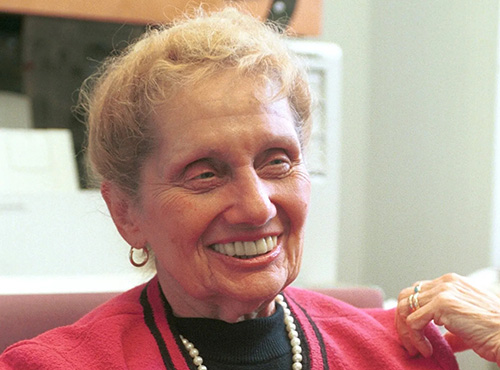In memoriam: Helen Davies
Helen Conrad Davies, a microbiology professor, passionate educator and proponent for racial and gender equality at the University of Pennsylvania, died on March 23, 2022. She was 97.

Born Helen Rogoff on February 14, 1925 in Manhattan, Davies graduated from Hunter College High School for Intellectually Gifted Young Ladies at age 15 and from Brooklyn College with a degree in chemistry at age 19. After receiving a master’s degree in biochemistry from the University of Rochester in 1950, she earned her Ph.D. in physical biochemistry at Penn while raising her sons Daniel and Richard.
Davies joined the microbiology department at Penn as the first female faculty member in 1965; in 1982, she became the department’s first female full professor. Her research focused on the biochemistry of energy generation in prokaryotes. Specifically, she characterized and compared the kinetics of cytochrome enzymes across species, cellular locations such as the membrane or cytoplasm, and other biological variables. She was also active in the medical education literature.
Known on campus as the “singing professor,” Davies was a dynamic educator who taught generations of Penn students about infectious diseases using bespoke lyrics set to the tunes of popular songs such as one about leprosy to the tune of the Beatles’ “Yesterday.” She mentored students in her lab; expanded access to education and research through collaborations with local high schools, Baltimore’s historically black Morgan State University, and other organizations; and persistently advocated for the fair treatment of women and members of historically underrepresented groups on the faculty at Penn.
Davies’ accomplishments as an educator were recognized by numerous honors, including the Lifetime Mentor Award from the American Association for the Advancement of Science in 1999, the National Excellence in Teaching Award from the American Medical Student Association in 2001 and the Alpha Omega Alpha Robert J. Glaser Distinguished Teacher Award from the Association of American Medical Colleges in 2006.
After the death of her husband, Robert, in 1993, Davies moved into the dormitories at Penn’s Ware College House as the faculty master, where she continued to host, educate, advise and support her beloved students for nearly two decades. She is survived by her sons, Daniel and Richard.
Enjoy reading ASBMB Today?
Become a member to receive the print edition four times a year and the digital edition monthly.
Learn moreGet the latest from ASBMB Today
Enter your email address, and we’ll send you a weekly email with recent articles, interviews and more.
Latest in People
People highlights or most popular articles

Building a career in nutrition across continents
Driven by past women in science, Kazi Sarjana Safain left Bangladesh and pursued a scientific career in the U.S.

Kiessling wins glycobiology award
She was honored by the Society for Glycobiology for her work on protein–glycan interactions.

2026 ASBMB election results
Meet the new Council members and Nominating Committee member.

Simcox wins SACNAS mentorship award
She was recognized for her sustained excellence in mentorship and was honored at SACNAS’ 2025 National Conference.

From humble beginnings to unlocking lysosomal secrets
Monther Abu–Remaileh will receive the ASBMB’s 2026 Walter A. Shaw Young Investigator Award in Lipid Research at the ASBMB Annual Meeting, March 7-10 in Washington, D.C.

Chemistry meets biology to thwart parasites
Margaret Phillips will receive the Alice and C. C. Wang Award in Molecular Parasitology at the ASBMB Annual Meeting, March 7-10 in Washington, D.C.

